Coverage of last week’s regional security conference in Guatemala City was dominated by U.S. Secretary of State Hillary Clinton’s announcement that the U.S. intends to spend some $300 million helping Central American governments combat drug-related violence. While the announcement might be considered politically delicate, given the growing unpopularity in Mexico of similar U.S. assistance in recent years, it also raises the question of how much Central American nations may be willing to match the U.S. commitment. “What you see is that Central America governments’ own investment doesn’t match the magnitude of the problem, particularly when it comes to dedicating resources […]
Aid and Development Archive
Free Newsletter
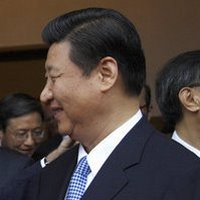
BEIJING — China’s expanding economic engagement with Latin America has been largely based on securing access to the continent’s abundant natural resources. But despite the opportunities presented by the wave of Chinese capital, concerns have arisen over the asymmetric and one-dimensional nature of China’s relations in the region, which generally conform to the classic center-periphery model. Chinese Vice President Xi Jinping’s recent three-country tour of the continent was aimed at addressing these concerns, outlining a blueprint for how China’s incoming leadership intends to deepen its international relations and consolidate recent economic foreign policy gains. In 2010, more than 90 percent […]
Last month, the Australian government announced that it would pursue a deal with Malaysia to resettle some Australian-bound asylum seekers. In an email interview, Matthew J. Gibney, an expert in asylum policies at Oxford University, discussed Australia’s “Malaysian Solution.” WPR: How would the Australian government’s “Malaysian Solution” operate? Matthew J. Gibney: The “Malaysian Solution” is a deal, initially outlined on May 7, but yet to be finalized, between Australia and Malaysia, under which up to 800 asylum seekers who land in Australian territories would be transferred to Malaysia. In Malaysia, the asylum seekers would be processed for refugee status by […]
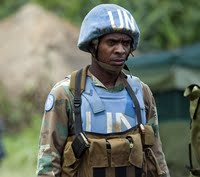
Editor’s note: This is the second of a two-part series on rebel groups in Central Africa. Part I examined recent moves toward peace and stability in Chad and the Central African Republic. Part II examines ongoing instability in Sudan and the Democratic Republic of the Congo. While Chad and the Central African Republic (CAR) are dismantling rebel groups and moving toward greater stability, Sudan and the Democratic Republic of the Congo (DRC) are continuing on a violent path. On July 9, Sudan will become two nations. The Republic of Southern Sudan, which will enter independence as one of the poorest […]
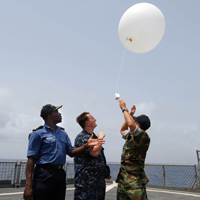
In his greeting sent to the 16th World Meteorological Congress, which wrapped up in Geneva on June 3, U.N. Secretary General Ban Ki-moon welcomed proposals on the congress’ agenda that he said (.pdf) would “assist the poorest and most vulnerable countries [to] adapt to inevitable impacts [of climate change].” Ban urged members to “continue [their] work to improve predictions and early warning on impending weather and climate hazards. This issue will only grow in importance.” Indeed, increases in climate variability have negatively affected the economic development and welfare of the least developed nations over the past several decades. For much […]
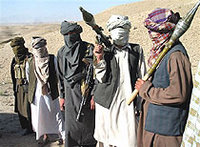
In recent weeks Taliban fighters have been handing over their weapons in record numbers in Afghanistan. This spike in the defection rate, perhaps motivated by Osama bin Laden’s death, has opened an important window of opportunity for U.S. and NATO forces fighting there. But so far the West has not been able to capitalize on this surge in Taliban defections effectively. In fact, in some cases, those interested in abandoning the insurgency and joining the government’s side are even being turned away. The failure to prioritize and generously fund defection and reintegration programs in Afghanistan poses a threat to the […]
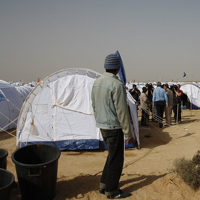
As the popular uprisings against authoritarian regimes continue in several Arab countries, those countries’ neighbors and the wider international community are being forced to deal with a new crisis: the growing number of conflict refugees. During the past five months, thousands of Libyans have fled to Tunisia and Egypt. Many have also tried to cross the Mediterranean into Europe, with some dying at sea. The continuing violence in Syria has also forced thousands of Syrians to seek refuge in Lebanon. The situation in Syria may yet escalate into a full-fledged sectarian conflict between the majority Sunnis and the ruling Alawis. […]
In May, lawmakers from the European Union and the Africa, Caribbean and Pacific group urged Madagascar to install a transitional leadership ahead of planned elections. In an email interview, Stephen Ellis, a Madagascar expert at the African Studies Center in Leiden, the Netherlands, discussed Madagascar’s ongoing political crisis. WPR: What is the background of Madagascar’s political crisis? Stephen Ellis: The immediate origin of Madagascar’s political crisis was the forced resignation of the elected president, Marc Ravalomanana, on March 17, 2009, in an effective military coup. Ravalomanana had become unpopular — not only within Madagascar’s political elite, but also among aid […]
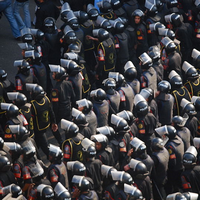
In March, the Stimson Center released a report (.pdf) by Gordon Adams and Rebecca Williams reviewing U.S. security assistance programs. Titled “A New Way Forward,” the report argued that the United States should restructure its security assistance programs away from “security,” as defined in Cold War terms, and toward “governance,” which more accurately reflects U.S. interests in the post-War on Terror world. The difference is hardly trivial. “Security” assistance focuses on improving the tactical and operational capabilities of fielded armed forces, whether against domestic or international foes, while “governance” assistance aims to “strengthen state capacity in failing, fragile, collapsing and […]
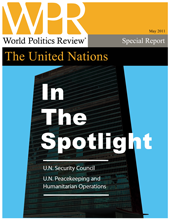
With the U.N. in the global spotlight for its involvement in high-stakes missions in Libya, Sudan, Côte D’Ivoire and elsewhere, this World Politics Review special report examines the U.N. through articles published in the past year.Below are links to each article in this special report. U.N. Security Council New Members Make for a Real Security Council at Last Richard Gowan and Bruce D. Jones October 20, 2010 Indian Power and the United Nations Richard Gowan November 15, 2010 No U.N. Security Council Reform, No Problem Richard Weitz January 4, 2011 New Tools for New Times Bruce D. JonesJanuary 11, 2011 […]
